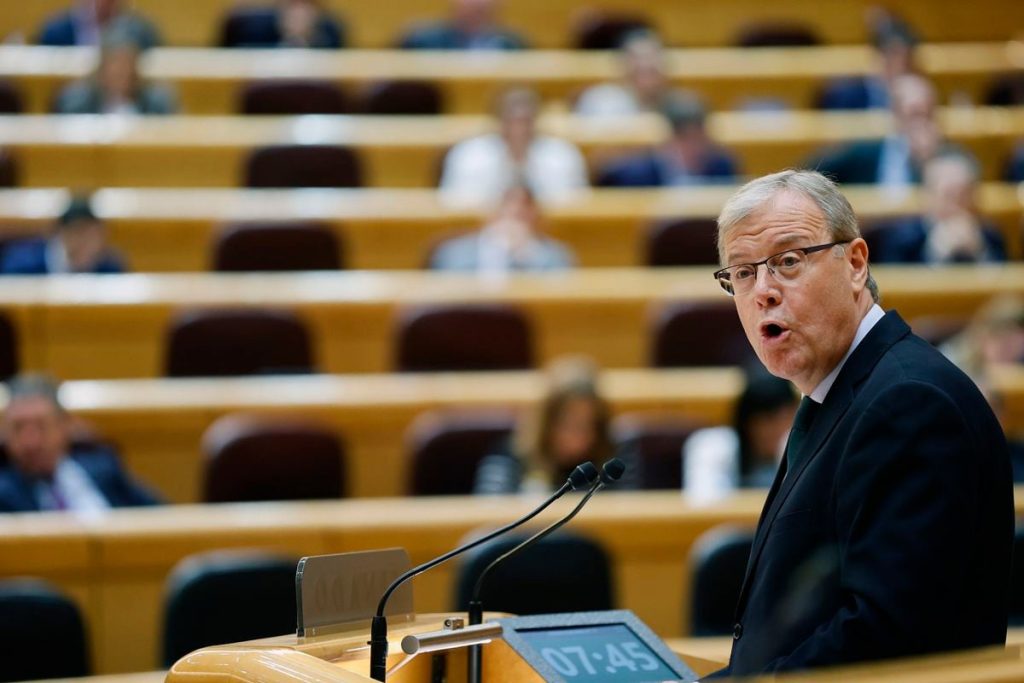The proposal for an amnesty law has been discussed in the Senate for almost a month, taking over the activity of the upper chamber, where the PP has an absolute majority. This Wednesday, the Popular Party’s strategy has led to an unprecedented debate about the supposed conflict of powers between the Congress and the Senate regarding the law. Senator Antonio Silván from the PP has started the session to defend his party’s stance on this clash of competences, which is expected to be approved in the vote later today. According to the Popular Party, the amnesty for those involved in the Catalan independence process is a “covert constitutional reform” – as suggested by the report prepared by the Senate’s legal advisors – and therefore requires a consensus greater than the absolute majority (half of the seats plus one) obtained by the PSOE and its allies. These, on the other hand, have accused the PP of “institutional disloyalty” and of using the upper chamber for “partisan purposes.”
The socialists and their allies have denied that the Congress has usurped functions by approving the amnesty law, pointing out that the process is following parliamentary procedures like any other norm. Senator Francisco Manuel Fajardo from the PSOE has argued that this “legislative competence” is being exercised with all the required steps, therefore there is no institutional clash. He accused the Popular Party of leading the Senate to the “biggest ridicule in its history.” This led to a commotion in the PP’s bench when Fajardo made a parallelism between the institutional clash defended by the PP and the military coup attempt of February 23rd, calling it a “complete absurdity.” His colleague, Senator Toni Magdaleno from the PSOE, also criticized the lack of respect and institutional disloyalty shown by a political party.
The government’s allies have reinforced this argument. Enric Morera from Compromís told the PP to stop “prostituting” institutions by granting amnesties to their corrupt members. Carla Antonelli from Sumar criticized the PP for devaluing the image of the Senate with their actions. Estefanía Beltrán de Heredia from the PNV suggested that the PP is trying to create a conflict of constitutionality, highlighting their failure to renew the General Council of the Judiciary. Sara Bailac from ERC dismissed the conflict of competences as a mere “idea” and mentioned the doubts within the PP about taking the matter to the Constitutional Court if the Congress does not respond or does so negatively. Teresa Pallarès from Junts insisted that there is no strict usurpation of functions and called for the parliamentary process to continue undisturbed.
The debate ended after an hour and 40 minutes. The vote will take place at the end of the session, around 5:00 pm. Senator Antonio Silván from the PP spoke last in a second round, addressing the PSOE: “You are so committed to arbitrariness that you are starting to become scary. Do not humiliate the State any further, do not humiliate the Spaniards,” he concluded. The debate in the Senate reflects the political tensions surrounding the amnesty law and the power struggles between different parties in Spain’s political landscape. The clash between the Popular Party and the PSOE, along with their respective allies, highlights the deep divisions and disagreements over issues related to the Catalan independence process and the use of parliamentary procedures for political gain. The outcome of the vote will determine the future path of the amnesty law and its implications for the ongoing political dynamics in Spain.


